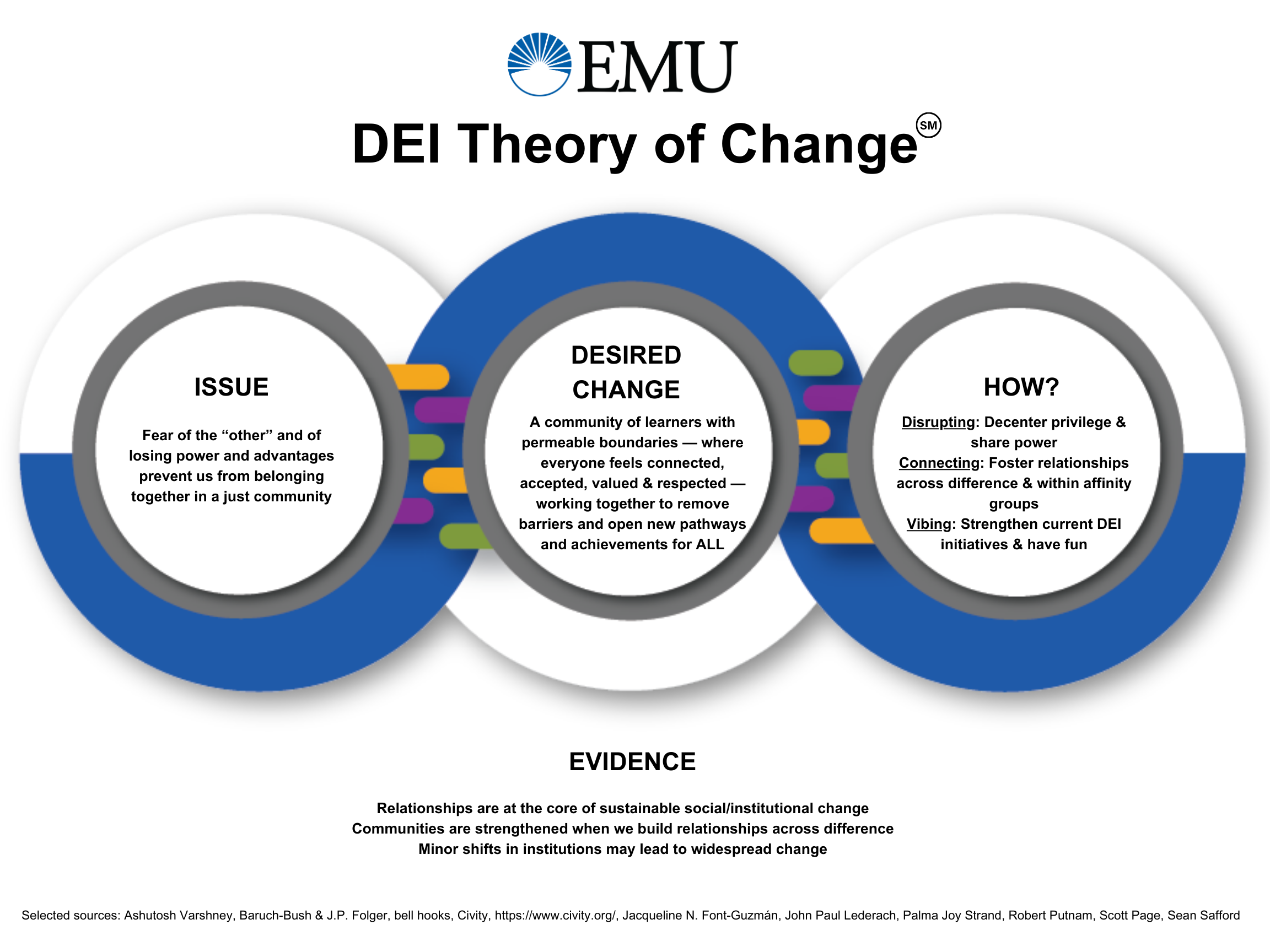Our Definitions & Theory of Change
At EMU, we are committed to advancing and supporting students, faculty, and staff in diversity, equity, inclusion, and belonging efforts through institutional transformation. As a peace and justice university with a restorative justice focus, we prioritize inclusivity, nurturing reciprocal relationships, healing and repairing past and current harms, and transforming unjust structures. We believe in and celebrate the power of community in advancing change. Our dedication to academic excellence is directly linked to our commitment to DEI.
- Diversity - We are committed to embracing persons who represent a range of backgrounds, experiences, social identities, and views that intersect in many ways. We value the uniqueness and gifts of each individual. Some examples of diverse factors include race and ethnicity, gender and gender identity, sexual orientation, relationship status, socio-economic status, language, culture, place of origin, religious, spiritual, and non-religious expressions, age, educational background, and (dis)ability status.
- Equity - We are committed to working in a relationship to identify and name what each member of our community needs to have equal access and opportunities to thrive. We will take the necessary steps to correct past, present, and future inequities. This includes removing systemic barriers that have historically prevented full participation for marginalized groups, within both EMU and society at large.
- Inclusion - We are committed to ensuring that everyone is an active participant in our community of learners and is seen for who they are. This means intentionally engaging with diversity to foster spaces where everyone can belong, both within affinity groups and across differences, recognizing cultural norms and biases, discussing issues of equity or privilege, and respecting the expression of diverse ideas.
- Belonging - We are committed to fostering a sense of connection with each other and within the school/campus/institution/community. We work to build reciprocal relationships where everyone’s humanity and right to exist are not threatened; we strive for everyone to feel accepted, respected, loved, and valued.
- Social Justice - We are committed to nurturing communities—especially for those who are oppressed and marginalized—that uphold people’s dignity and human rights. Acknowledging our own power and challenging structural inequities, we strive for shared accountability for the wellbeing of others. Members are just and equitable in their treatment of all and act to discourage and/or intervene to prevent unjust and inequitable behaviors.
- Community - We are committed to caring for each other, close at home and far away. Community is about accountability to one another, building together—with shared values— the kind of campus community we want. Being in community with each other is how we aspire to experience our faith, spirituality, identities, and belongingness since the inception of EMU.
- First Generation Student - Neither parent or guardian earned a four-year college degree from an institution in the U.S.

References that Inspired our Definitions:
- Green, S. W. & Krabill, J.R. (eds.) (2015). Fully Engaged: Missional Church in an Anabaptist Voice. Herald Press.
- hooks, b.(2003). Teaching Community: A Pedagogy of Hope. Routledge.
- Lorde, A. (2017). Your silence will not protect you. Silver Press.
- Mayer, B. & Font-Guzmán, J.N. (2022). The Neutrality Trap: Disrupting and Connecting for Social Change. Wiley.
- Minnow, M. (1991). Making All the Difference: Inclusion, Exclusion, and American Law. Cornell University Press.
- NADOHE (2021). A Framework for Advancing Anti-Racism Strategy on Campus.
- Stoltzfus, R. S., & Shearer, T. M. (2021). Been in the struggle: Pursuing an antiracist spirituality. Herald Press.
- Strand, P.J. (2017). Loving and Loving: Eroding the Stance of Other, 50 Creighton Law Review 621-636.
- Strayhorn, T. L. (2012). College students’ sense of belonging: A key to educational success for all students. Routledge.
- Tatum, B.D. (2017). Why are all the Black Kids Sitting Together in the Cafeteria? Basic Books.
- Young, I.M. (1990). Justice and the Politics of Difference. Princeton University Press.


